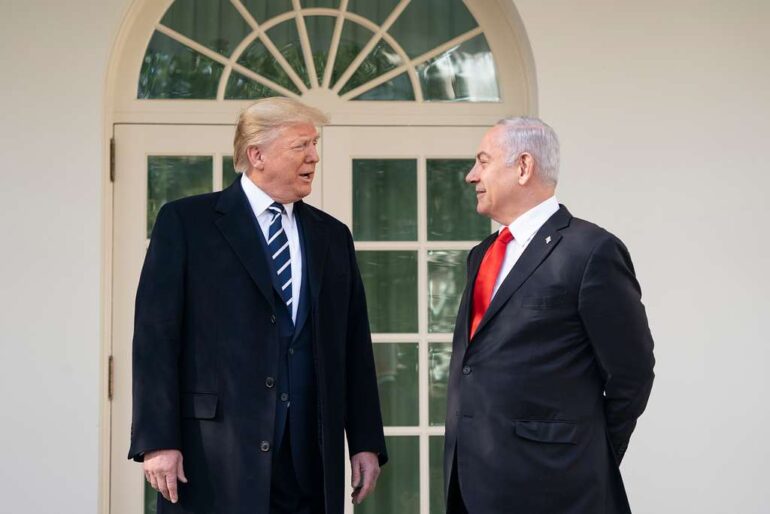In recent weeks, United States President Donald Trump has made headlines for a string of baffling and, frankly, offensive gestures in the Semitic region.
He invited Edan Alexander — a young Israeli man recently released from Hamas captivity — to Qatar, of all places. A country known to bankroll Hamas. A place no former hostage should be asked to visit.
Then came the next move: trying to pull Syria into the Abraham Accords, as if Israel should be eager to link arms with one of its most hostile neighbors.
To many observers, Trump is simply being Trump; insensitive, brash, transactional. But maybe, in this case, his bluntness is actually doing Israel — and Diaspora Jews — a favor.
These recent moves expose something deeper that’s long been hiding under the surface of the US–Israel relationship – a power dynamic that’s far from equal, and an unhealthy dependency that might finally be ready to break.
Not-So-Happily Ever After
For decades, many Israelis and Diaspora Jews have thought of the United States and Israel as geopolitical soulmates. Jews in the US proudly wave the Stars and Stripes alongside the Israeli flag, believing in a shared moral mission — two democracies, tied together by faith, freedom, and friendship.
But beneath the surface, the relationship has rarely been equal. It’s looked more like a marriage where one partner — Israel — keeps quiet, smiles for photos, and follows the other’s lead. Israel may be militarily strong. But politically and psychologically, it’s often acted like a submissive spouse: deferring, accommodating, dependent.
This isn’t just political. It’s deeply psychological — a mirror of Jewish historical experience.
For centuries, Jews have had no voice. We’ve been the guests in someone else’s country, listening, accommodating, surviving by learning what the dominant culture wanted from us and giving it to them. Even now, with a state of our own, that habit persists.
So when Trump suddenly acts like the cold, withholding spouse — not checking in, not asking what we want, telling us to make our own decisions — we don’t know how to respond. It’s disorienting. We’ve never really had the chance to practice sovereignty. We’ve confused security with obedience.
But maybe that’s the real gift hidden in Trump’s crassness.
Trump’s Blunt Wake-Up Call
Trump is who he is. He doesn’t like being told he owes anyone anything. Not Ukraine. Not NATO. Not Israel. The moment someone acts like they have a claim on him, he pulls away — hard. It’s narcissistic, yes. But in this case, it’s also clarifying.
He’s telling Israel — and by extension, the Jewish people — I don’t owe you anything. You’re not my pet project. You’re a nation. Be one.
It’s harsh. But it’s honest. And in a strange way, it might be one of the most respectful things a US president has done for Israel in a long time. Because it forces us to ask “Who are we without Uncle Sam holding our hand? What do we believe? What do we want? What decisions would we make if we weren’t afraid of offending our ‘big brother’?”
The dependency has gone on too long. It has stunted our political and emotional growth. And now, as Trump peels away the illusion of eternal, unquestioning support, he’s giving us a strange kind of gift – the invitation to stand on our own feet.
Growing Pains Ahead
Of course, this won’t be smooth. Just like any codependent relationship, the moment the quieter partner begins to assert themselves, things get rocky. If Israel dares to say “actually, we disagree,” Trump will likely lash out. He’ll criticize, threaten, maybe even withdraw support. That’s what happens when roles are reversed in a lopsided relationship.
But that’s how you know you’re growing. The discomfort is part of the individuation process.
And on a deeper level, this might be exactly what the Jewish people need. We’ve always listened too closely to the dominant voice. Whether in exile or alliance, we’ve survived by adapting, by keeping the peace, by playing the part. Now,we are being told — bluntly — “you’re free to decide.”
And it turns out, we’re not sure how.
But that confusion is a beginning. It’s the first moment of real autonomy.
Embracing a New Vision
This moment of reevaluation aligns with the principles advocated by the VISION Movement. The movement promotes a philosophy that seeks to synthesize Jewish national consciousness with universal human values, aiming for a Jewish identity that acknowledges past injustices and strives for a more inclusive future.
VISION challenges the traditional Zionist narrative by advocating for a one-state solution that ensures equal rights for both Jews and Palestinians. VISION encourages Jews to move beyond the roles assigned by historical oppression and to engage in genuine partnerships with our neighbors.
By confronting the uncomfortable truths about the US–Israel relationship, as highlighted by Trump’s actions, Israel has the opportunity to redefine its identity and policies in a way that aligns with these more inclusive and self-determined values.
Time to End the Illusion
It’s time to be honest. There is no reason to assume that Washington and Jerusalem should always share the same interests. These are two different nations, in two different regions, with different challenges and different needs. Expecting perfect alignment is not only unrealistic — it’s dangerous. It keeps Israel trapped in a role of obedience, rather than leadership.
As time goes on, the US will forge new alliances. So will Israel. That’s not betrayal. It’s adulthood.
The myth of the perfect geopolitical marriage needs to die. Because only when the illusion dies can real partnership begin — not one based on dependency, but on mutual respect, clarity, and sovereignty.
So yes, Trump is being an insensitive clod but maybe that’s a good thing. Maybe it’s just the opportunity that we have been waiting for; the opportunity to develop a vision for our own destiny.





